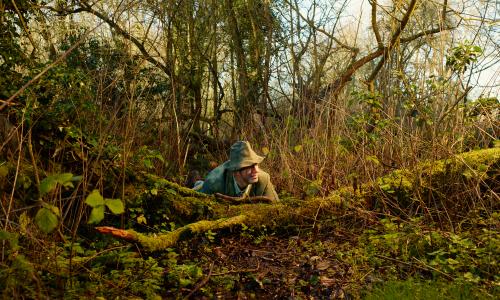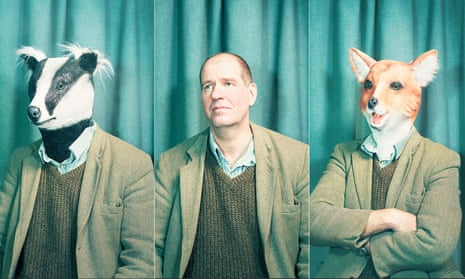Worms from the Chablis region of France, when chewed, have a long, mineral finish. Worms from Picardy are apparently musty, like splintered wood. Worms from the high Kent Weald are fresh and uncomplicated. And worm flavours change with the season as well as the region: Norfolk worms have a tang of nappy liner in August, but paraffin in January.
When I reached this exploration of the terroir of worms a short way into Charles Foster’s strikingly funny and profound book, I wondered if I was being had. Here, surely, was the ultimate parody of the nature writer’s lament that we are disastrously estranged from the wild world.
Being a Beast has a terrific premise: Foster seeks to live as a badger, an otter, a fox, stag and swift, in order to better understand their lives and ours. From a distance, it resembles a stunt, but this elegantly written execution of the challenge is both sincere and self-mocking, flippant and deadly serious.
The worm-munching is because they constitute the bulk of a British badger’s diet, and Foster heads to Wales to begin life as a badger, accompanied by his eight-year-old son, Tom. A JCB-driving farmer friend helps them dig a sett in a hillside and they take up residence.
In seeking to unite human and animal worlds, Foster is aware he is following an ancient shamanistic tradition. But he rejects the idea of a modern-day shaman who sets up shop in a festival tepee and believes he can jump into the body of another being with a modest spot of meditation: any attempt to shed our human skin requires a lot of legwork, or “wingwork”. He is also critical of the “quasi-shamanism” of JA Baker in his classic book The Peregrine, whereby Baker obsessively pursued some falcons until he suggested he had become one.
In contrast, Foster believes there is always a boundary between himself and animals. He seeks to peer over it by exploring physiology and the way his quarry (he is a repentant country sportsman) use the landscape and share it with humans. What unfolds is not “an ecstatic utterance from a man-badger” but a slog, and Foster is constantly aware of falling short.

There are plenty of opportunities for squeamish giggles as Badger-Foster and his cub devour worms and lap “from a pool where leeches waved at our lips”. Yet his approach also produces insight into the lifestyles – and emotions – of animals. Even trivial experiences are revealing. He notices how Tom sniffs in fast bursts: it’s called odour sampling, and is exactly what scent-reliant mammals do.
Tom proves a better badger than his dad. He swims breaststroke through the grass, insists he can hear a woodpecker’s tongue in tree bark – “Imagine a nail file whispering” – and detects bank vole runs with his nose. Foster’s feelings of failure, “the Puck of otherness had dodged away”, shift when he returns to Abergavenny and realises the transformative nature of his experience. “The town blared, belched, leered and cackled. There was more variegation on one leaf outside our setts than there was in the whole place,” he writes. “I felt sick from shock and boredom and the heaving floors of deafening smell.”
His failure in trying to be a badger is magnificent, but his attempt to become an otter is hampered by his contempt for the species; and his passages about the red deer are more about his own stalking follies and an act of repentance: having bloodhounds turned on him. However, Foster’s attempt to live like an urban fox – he forages in bins and sleeps in gardens – is superbly revealing, of modern people (“In a few generations we’ve turned into sclerosed super-specialists, each in a niche so tight that our limbs can’t stretch and our brains can’t turn”) and modern Vulpes vulpes. Foster shows this most familiar of animals in a joyfully new light: consider that the urban fox we see slinking across the street almost certainly has fractured bones, fused joints and arthritis. “When they walk along fence tops like teenage Olympic Romanians on the beam, or blast from a hedge on to a wood pigeon, or seep like mercury up to a rabbit, they’re doing it with a back so bad that, were they office workers, it would have them signed permanently off work.”
Foster is a worthy heir to an eccentric tradition of English environmental writing exemplified by Roger Deakin. “Wetsuits are condoms that prevent your imagination from being fertilised by mountain rivers,” sounds just like Deakin. He and Foster share wit, learning worn lightly and a charming presence throughout their books. Foster’s self-criticism is sincerely felt, I’m sure, and might also serve to disarm potential critics.
I had hoped that his final attempt at being beastly would find him spending a summer under grimy eaves in Oxford, following David Lack’s classic Swifts in a Tower, but he wisely doesn’t. There is no moment of transcendence but swifts nevertheless provide Foster with a manifesto: we must feel wonder and share habits. Wonder, he argues, comes from an attention to detail: “Only those blind to the velvet flow of a caterpillar’s legs and deaf to the grunt of a crocus as it noses out of the earth don’t worship.” Amazing swifts are still subject to the same laws of nature as us. “We share a jurisdiction and hence a passport. We can live together; we can travel together; we already have some shared habits, and we can work on acquiring more.”
Illuminating and unfailingly entertaining, this book is a tour de force of modern nature writing, and shows us how to better love the world beyond ourselves.

Comments (…)
Sign in or create your Guardian account to join the discussion